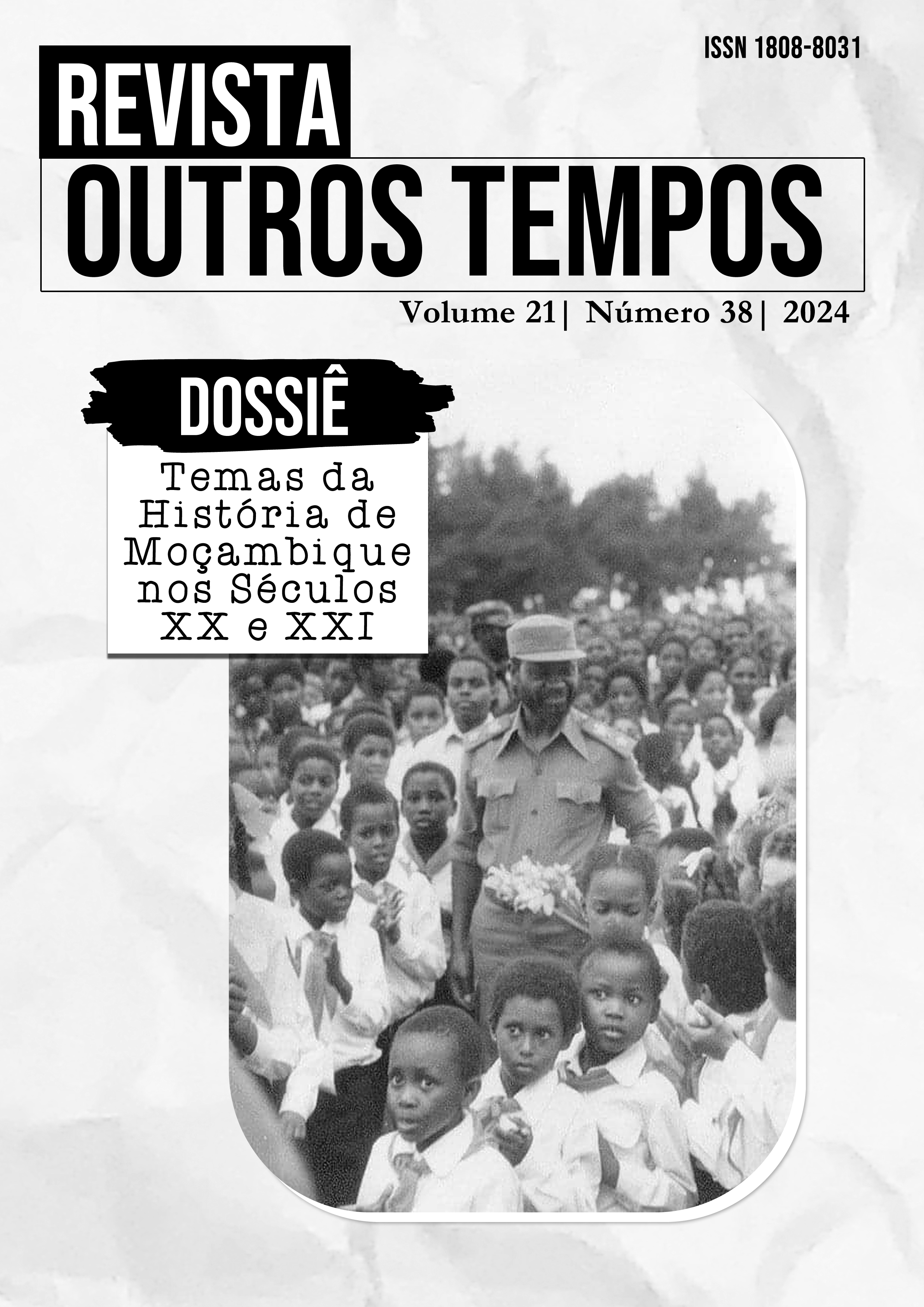O CONCEITUANDO UBUNTU AFRO-AUSTRAL PARA UMA NOVA VISÃO DOS DIREITOS HUMANOS EM MOÇAMBIQUE
DOI :
https://doi.org/10.18817/ot.v21i38.1170Mots-clés :
Ubuntu como princípio ético-moral. , Direitos humanos. , Humanismo.Résumé
: Em primeiro momento, o artigo busca apresentar diferentes conceitos da filosofia Ubuntu e a sua conformação com lógica dos direitos humanos. E, por outro lado, o artigo caracteriza e analisa Ubuntu enquanto conjunto organizado de princípios e normas ético-morais, no que concerne à sua construção histórica e teórico-concetual, concedendo enfoque à sua recuperação no período após as chamadas transições político-económicas em África, nos anos 1990, com especial atenção para a República de Moçambique, dado que será, nessa altura, que se assistirá a uma maior afirmação político-social de Ubuntu e da sua recuperação ou renascimento. Por outro ângulo, o artigo define Ubuntu/Umuntu como um princípio que posiciona a vida de todos os entes que habitam o planeta Terra, incluindo toda a família humana, e não propriamente somente a dos seres humanos. Portanto, Ubuntu defende e salvagurda valores como humanismo, dignidade, alteridade, comunitariedade, solidariedade e interculturalidade, à luz da cosmovisão africana da vida, no seu sentido mais geral e abrangente possível. Inobstante, o trabalho discute categorias da filosofia Ubuntu-africana em variadas perspectivas, nomeadamente Muntu, Kintu, Hantu e Kuntu (permeadas por Ubuntu), ou seja, entes (seres vivos, não vivos e ainda-não-nascidos) e não seres vivos somente no sentido puramente biológico.
Téléchargements
Références
ANGIONI, L. Prioridade e substância na metafísica de aristóteles. Doispontos, v. 7, n. 3, p. 75-106, 2010. Disponível em: file:///C:/Users/hp/Downloads/14818-63847-1-PB.pdf Acesso em: 4 mar. 2022.
APPIAH, K. A. Na casa de meu pai: A África na filosofia da cultura. Rio de Janeiro, Brasil: Contraponto, 1991.
BEHRENS, K. G. Hearing sub-Saharan African voices in bioethics. Theor Med Bioeth, v. 38, p. 95-99, 2017. Disponível em: https://link.springer.com/content/pdf/10.1007/s11017-017-9406-z.pdf Acesso em: 20 jan. 2023
BENDOR-SAMUEL, J. T. Bantu languages. London, United Kingdom: The Editors of Encyclopaedia, 2024. Disponível em: https://www.britannica.com/art/Bantu-languages Acesso em: 12/05/2022
BERGER, P. L.; LUCKMANN, T. A construção social da realidade: Tratado de sociologia do conhecimento. Petrópoles: Editora Vozes, 2004.
BHENGU, M. J. Ubuntu: The essence for democracy. Cape Town, South Africa: Novalis Press, 1996.
BINSBERGEN, W. Ubuntu and the globalization of southern Africa thought and society. Quest, v. 14, n. 1-2, p. 53-89, 2001.
BOISSEVAIN, J.; RICHARDSON, J. W.; NETSHANDAMA, V.; DILLINGHAM, R. The quest for Ubuntu: Water and Health in Limpopo (WHIL) partnership. Winter, v. 15, n. 4, p. 26-45, 2013. Disponível em: https://www.ncbi.nlm.nih.gov/pmc/articles/PMC4270124/ Acesso em: 11 maio 2022.
BOLDEN, R. Ubuntu. In: COGHLAN, D.; BRYDON-MILLER, M. (ed.). Encyclopedia of action research. Bristol, England: Sage Publications, 2014. p. 1-8.
BREDA, A. D. Developing the notion of Ubuntu as African theory for social work practice. Social Work/Maatskaplike, v. 55, n. 4, p. 338-450, 2019. Disponível em: http://dx.doi.org/10.15270/52-2-762 Acesso em: 1 jun. 2021.
BREEMS, B. Relational being as icon or communal freedom: Southern, Africa’s Ubuntu. Journal of Sociology and Christianity, v. 6, n. 2, p. 56-79, 2016. Disponível em: https://sociologyandchristianity.org/index.php/jsc/article/view/6/4 Acesso em: 21 nov. 2020.
BUQA, W. Storying Ubuntu as a rainbow nation. Verbum et Ecclesia, v. 36, n. 2, 1-8, 2015. Disponível em: http://dx.doi.org/10.4102/ve.v36i2.1434 Acesso em: 1 dez. 2019.
CAETANO, A. Para uma análise sociológica da reflexividade individual. Sociologia, Problemas e Práticas, n. 66, p. 157-174, 2011. Disponível em: https://journals.openedition.org/spp/523 Acesso em: 2 out. 2021.
CARTWRIGHT, M. Bantu migration. Godalming, United Kingdom: World History Encyclopedia, 2018. Disponível em: https://www.worldhistory.org/Bantu_Migration/ Acesso em: 12 maio 2022.
CASTIANO, J. P. Referências da filosofia africana: em busca da intersubjetivação. Maputo: Ndjiira, 2010.
CAVALCANTE, K. L. Fundamentos da filosofia Ubuntu: afroperspetivas e o humanismo africano. Revista Seminário de Visu, v. 8, n. 2, p. 184-192, 2020. Disponível em: file:///C:/Users/hp/Downloads/1094-3992-1-PB.pdf Acesso em: 10 jan. 2022.
CHAUI, M. Convite à filosofia. São Paulo: Editora Ática, 2010. Disponível em: https://www.home.ufam.edu.br/andersonlfc/Economia_Etica/Convite%20%20Filosofia%20-%20Marilena%20Chaui.pdf Acesso em: 5 jun. 2021.
CHAVO, A. Morre o Homem e Permanece a Obra. Maputo, Moçambique: O País, 2021. Disponível em: https://opais.co.mz/morre-o-homem-e-permanece-a-obra/ Acesso em: 5 dez. 2021.
CHIZIANE, P. O canto dos escravizados. Maputo: Matiko e Arte, 2018.
CONVERSATIONS of the world – Mogobe B Ramose and Boaventura de Sousa Santos (Part 1). Alice Ces, 5 ago. 2016. Disponível em: https://youtu.be/UEDNoZg3G4Y Acesso em: 15 nov. 2022.
COOK, M. More Ubuntu, less autonomy, says South African bioethicist. Bioethics Online Magazine, 2017. https://bioedge.org/bioethics-d75/more-ubuntu-less-autonomy-says-south-african-bioethicist Acesso em: 10 jan. 2022.
CORNELL, D.; MARLE, K. V. Exploring Ubuntu: Tentative reflections. African Human Rights Law Journal, v. 5, n. 2, p. 195-220, 2005. Disponível em: https://www.ahrlj.up.ac.za/images/ahrlj/2005/ahrlj_vol5_no2_2005_cornell_van_marle.pdf Acesso em: 21 nov. 2020.
COUTINHO, J. Elementos de história da filosofia medieval. Lisboa: Universidade Católica Portuguesa, 2008. Disponível em: http://hdl.handle.net/10400.14/12729 Acesso em: 30 jan. 2022.
COUTO, M. Moçambique – 30 anos de independência: No passado, o futuro era melhor? Via Atlântica, n. 8, 191-204, 2005. Disponível em: https://www.revistas.usp.br/viaatlantica/article/view/50020/54152 Acesso em: 21 nov. 2020.
CRAHAY, F.;VICTOR, A. V. Conceptual take-off conditions for a Bantu philosophy. Sage Journals, v. 13, n. 52, p. 55, 1965. Disponível em: https://doi.org/10.1177/039219216501305204 Acesso em: 11nov. 2022.
DJALO, Mamadu. Filosofia bantu: uma leitura introdutória. Orientador: Cléber Daniel Lambert da Silva. 2017. Trabalho de Conclusão de Curso (Bacharelado em Humanidades) – Instituto de Humanidades e Letras, Universidade da Integração Internacional da Lusofonia Afro-Brasileira, São Francisco do Conde, 2017.
DOLAMO, R. Botho/ubuntu: The heart of African ethics. Scriptura, v. 112, p. 1-10, 2013. Disponível em: https://doi.org/10.7833/112-0-781-10 Acesso em: 13 mar. 2023.
DUSSEL, E. World-system and “trans”-modernity. Nepantla, v. 3, n. 2, p. 221-244, 2002. Disponível em https://doi.org/10.4324/9780429027239-9 Acesso em: 21 nov. 2019.
DUSSEL, E. Transmodernidade e interculturalidade: interpretação a partir da filosofia da libertação. Revista Sociedade e Estado, v. 31, n. 1, p. 51-73, 2016. Disponível em: https://doi.org/10.1590/S0102-699220160 00100004 Acesso em: 21 nov. 2019.
DUSSEL, E. Filosofia política en América Latina –Dr. Enrique Dussel, part 1 de 8 [Vídeo]. Youtube , jul. 4, 2019. Disponível em: https://www.youtube.com/watch?v=q8n_2zkdC0Y Acesso em: 21 nov. 2019.
ENSLIN, P.; HORSTHEMKE, K. Can Ubuntu provide a model for citizenship education in African democracies? Comparative Education, n. 40, p. 545-558, 2004. Disponível em: https://doi.org/10.1080/030500604 200084538 Acesso em: 20 dez. 2022.
EWUOSO, C.; HALL, S. Core aspects of Ubuntu: A systematic review. South African Journal of Bioethics and Law, v. 12, n. 2, p. 93-103, 2019. Disponível em: https://doi.org/10.7196/SAJBL.2019.v12i2.6 79 Acesso em: 20 dez. 2022.
EZE, M. O. What is African communitarianism? Against consensos as a regulative ideal. South African Journal of Philosophy, v. 27, n. 4, p. 386-399, 2008. Disponível em: https://doi.org/10.4314/sajpem.v27i4.31526 Acesso em: 10 out. 2022.
FORSTER, D. A generous ontology: Identity as a process of intersubjective discovery – An
African theological contribution. HTS Teologiese Studies/Theological Studies, v. 66, n. 1, p. 1-12, 2010. Disponível em: https://doi.org/10.4102/hts.v66i1.731 Acesso em: 10 jun. 2022.
FURTADO, C. A. O continente africano e a produção africana do conhecimento. Revista Latino-Americana de Estados Avançados, v. 1, n. 1, 118-137, 2016. Disponível em: file:///C:/Users/hp/Downloads/lucasmesquita,+relea_v1n1_009_claudio_furtado_claudio_furtado_continente_africano_producao_conhecimento-1.pdf Acesso em: 15/01/2020
GADE, C. B. N. The historical development of the written discourses on Ubuntu. South African Journal of Philosophy, v. 30, n. 3, p. 303-329, 2011. Disponível em: https://doi.org/10.4314/sajpem.v30 i3.695 7 Acesso em: 21 nov. 2019.
GADE, C. B. N. What is Ubuntu? Different interpretations among South Africans of Af- rican descent. South African Journal of Philosophy, v. 31, n. 3, p. 484-503, 2012. Disponível em: https://doi.org/10.1080/ 02580136.2012.10751789 Acesso em: 21 nov. 2019.
GENI. Ntu – Semi-mythical forefather of the Bantu: The creation of Nguni groups. Florida, United States of America. Geni, 2015. Disponível em: https://www.geni.com/people/Ntu-semi-mythical-forefather-of-the-BaNtu/600000001 4311021540 Acesso em: 23 abr. 2022.
GONÇALVES, A. História de Moçambique. Delaware, United States of America. IDOCPUB, 2022. Disponível em: https://idoc.pub/queue/historia-demoambiquepdf-d4pq1dx53rnp Acesso em: 21 out. 2022.
GRAÇA, J. A. C. Guias das aulas de filosofia antiga I e filosofia antiga II. Porto: Universidade do Porto, 2010. Disponível em: https://ler.letras.up.pt/uploads/ficheiros/8273.pdf Acesso em: 5 jun. 2021.
GUERREIRO, M. B. N. Influências indígenas e africanas no léxico do português do Brasil. 2015. Dissertação (Mestrado em Português Língua Segunda, Língua Estrangeira) – Universidade Nova de Lisboa, Lisboa, Portugal, 2015.
HAEGERT, S. An African ethic for nursing? Nursing Ethics, v. 7, n. 6, p. 492-502, 2000. Disponível em: https://doi.org/10.1177/09697330000070 Acesso em: 20 jan. 2023.
HALLEN, B. Personhood in a communication context. Thought and Practice: A Journal of the Philosophical Association of Kenya, v. 7, n. 2, p. 1-10, 2015. Disponível em: http://dx.doi.org/10.4314/tp.v7i2.2 Acesso em: 21 nov. 2019.
HEDGES, D.; ROCHA, A.; MEDEIROS, E.; LIESEGANG, G.; CHILUNDO, A. História de Moçambique: Moçambique no auge do colonialismo, 1930-1961. Maputo: Universidade Eduardo Mondlane, 1993. v. 3. Disponível em: https://www.kufunda.net/publicdocs/al.sff.document.crp2b20002_final.pdf Acesso em: 21 nov. 2022.
HOFSTEDE, G. et al. Cultures and Organizations: Software of the Mind. New York, United States of America: McGraw-Hill, 2010.
JAHN, J. Muntu: Na outline of neo-african culture. African Music Journal of the International Library of African Music, v. 2, n. 4, p. 109, 1961. Disponível em: https://doi.org/10.21504/amj.v2i4.717 Acesso em: 02/10/2021
JOLLEY, D. R. Ubuntu: A person is a person through other persons. 2011. Dissertação (Master’s in Written Thesis and Documentary) - Universidade de Southern Utah, Estados Unidos da América, 2011.
KAGAMÉ, A. A. La philosophie Bantu comparée. Paris, France: Présence Africaine, 1976.
KAMWANGAMALU, N. M. Ubuntu in South Africa: a sociolinguistic perspective to a pan- African concept. Critical Arts, v. 13, n. 2, p. 24-41, 1999. Disponível em: https://doi.org/10.1080/0256004 9985310111 Acesso em: 3 abr. 2022.
KASHINDI, J-B. K. Ubuntu como ética africana, humanista e inclusiva. Cadernos IHUi- deias, v. 254, p. 15, p. 1-24, 2017. Disponível em: http://www.ihu.unisinos.br/images/stories/cadernos/ideias/254cadernosihuideias.pdf Acesso em: 3 abr. 2022.
KOENANE, M.; OLATUNJI, C. Is it the end or just the beginning of Ubuntu? Response to Matolino and Kwindingwi in view of Metz’s rebuttal. South African Journal of Philosophy, v. 36, n. 2, p. 263-277, 2017. Disponível em: http://doi.org/10.1080/02580136.2016.1225188 Acesso em: 20 nov. 2022.
KOMBO, J. Umuntu ngumuntu ngabantu ngabantu notion of person among African peo- ples and implications for the Christian faith. Faith and Ethnicity, v. 20, n. 20, p. 230-243, 2002. Disponível em: https://doi.org/10.1163/9789004389137_013 Acesso em: 3 abr. 2022.
KUBOW, P.; MIN, M. The cultural contours of democracy: indigenous epistemologies informing South African citizenship. Democracy & Education, v. 24, n. 2, p. 1-12, 2016. Disponível em: https://democra- cyeducationjournal.org/home/vol24/iss2/5/ Acesso em: 3 jan. 2023.
LODGE, T. Political corruption in South Africa. African Affairs, v. 97, n. 387, 157-187, 1999. Disponível em: https://www.jstor.org/stable/723262 Acesso em: 10 jan. 2021.
LUTZ, D. W. African Ubuntu philosophy and global management. J. BusEthics, v. 84, n. 3, p. 313-328, 2009. Disponível em: https://doi.org/10.1007/s10551-009-0204-z Acesso em: 20 dez. 2022.
MABOVULA, N. The erosion of African communal values: A reappraisal of the African Ubuntu philosophy. Inkanyiso: Journal of Humanities and Social Science, v. 3, n. 1, p. 38-47, 2011. Disponível em: file:///C:/Users/hp/Downloads/69506-Article%20Text-146066-1-10-20110913.pdf Acesso em: 20 jan. 2023.
MACHADO-DA-SILVA, C. L.; FONSENACA, V. S.; CRUBELLATE, J. M. Estrutura, agência e interpretação: Elementos para uma abordagem recursiva do processo de institucionalização. RAC, n. 4, p. 77-107, 2005. Disponível em: https://www.scielo.br/j/rac/a/hJJnzSV79pL68KPp7Y9jWLn/?format=pdf Acesso em: 9 nov. 2019.
MANGENA, F. African ethics through Ubuntu: A postmodern exploration. Africology:
The Journal of Pan African Studies, v. 9, n. 2, p. 66-80, 2016. Disponível em: http://www.jpanafrican.org/docs/vol9no2/9.2-6-Fainos.pdf Acesso em: 20 nov. 2022.
MARIS, C. W. Philosophical racism and Ubuntu: In dialogue with Mogobe Ramose. South African Journal of Philosophy, v. 39, n. 3, p. 308-326, 2020. Disponível em: https://doi.org/10.1080/02580136.2020.1809124 Acesso em: 20 jan. 2023.
MASOGA, M. A. A critical dialogue with Gabriel Molehe Setiloane: The unfinished business on the African divinity question. Studia Historiae Ecclesiasticae, v. 38, n. 1, p. 1-13, 2012. Disponível em: http://www.scielo.org.za/pdf/she/v38s1/03.pdf Acesso em: 12 maio 2023.
MATOLINO, B., & KWINDINGWI, W. The end of Ubuntu. South African Journal of Philosophy, v. 32, n. 2, p. 197-205, 2013. Disponível em: https://www.researchgate.net/publication/276888422_The_endofubuntu Acesso em: 20 jan. 2023.
MAYAKA, B.; TRUELL, R. Ubuntu and its potential impact on the international social
work profession. International Social Work, p. 1-14, 2021. https://doi/org/10.1177/00208728211022787 Acesso em: 10 out. 2022.
MBEMBE, J.-A. On the postcolony: Studies on the history of Society and culture. California, United States of America: University of California Press, 2001.
MBEMBE, J.-A. Necropolitics. Public Culture, v. 15, n. 1, p. 11-40, 2003. https://monoskop.org/images/4/49/Mbembe_Achille_2003_Necropolitics.pdf Acesso em: 20 jan. 2023.
MBOTI, N. May the real ubuntu please stand up? Journal of Media Ethics, v. 30, p. 125-147, 2015. Disponível em: https://core.ac.uk/download/pdf/54189989.pdf Acesso em: 10 out. 2022.
MEIRING, J. S. Ubuntu and the body: A perspective from theological anthropology as embodied sensing. Verbum et Ecclesia, v. 36, n. 2, p. 1-8, 2015. Disponível em: https://doi.org/10.4102/ve.v36i2.1423 Acesso em: 14 ago. 2020.
METZ, T. African and western moral theories in a bioethical context. Developing World Bioethics, v. 10, n. 1, p. 49-58, 2010. Disponível em: https://doi.org/10.1111/j.1471-8847.2009.00273.x Acesso em: 11 ago. 2021.
METZ, T. Ubuntu as a moral theory and human rights in South Africa. African Human Rights Law Journal, v. 11, n. 2, p. 532-559, 2011. Disponível em: http://www.scielo.org.za/scielo.php?script=sciarttext &pid=S1996-20962011000200011 Acesso em: 20 out. 2020
METZ, T. Confucian harmony from an African perspective. African and Asian Studies, v. 15, n. 1, p. 1-22, 2016. Disponível em: https://doi/org/10.1163/15692108-12341354 Acesso em: 13 mar. 2023.
METZ, T. Replacing development: An afro-communal approach to global justice. Philosophical Papers, v. 46, n. 1, p. 111-137, 2017. Disponível em: http://doi.org/10.1080/05568641.2017.1295627 Acesso em: 12 maio 2022.
METZ, T.; GAIE, J. B. R. The African ethic of Ubuntu/Botho: Implications for research on morality. Journal of Moral Education, n. 39, p. 273-290, 2010. https://doi.org/10.1080/03057240.20 10.497609 Acesso em: 12 maio 2022.
MIGNOLO, W. D. Prophets facing sidewise: The geopolitics of knowledge and the colo- nial difference. Social Epistemology, v. 19, n. 1, p. 111-127, 2005b. Disponível em: https://doi.org/10.1080/02691720500 084325 Acesso em: 15 mar. 2023.
MNYAKA, M.; MOTLHABI, M. The African concept of ubuntu/botho and its sociomoral significance. Black Theol, v. 3, n. 2, p. 215-237, 2005. Disponível em: http://doi.org/10.1558/blth.3.2.215.65725 Acesso em: 20 jan. 2023.
MOSANA, M. S. Effectivity and Productivity in Education: An Ubuntu Perspective. Potchchesroom: Potchchesroom University for Christian Higher Education, 2002.
MUDIMBE, V. Y. The invention of Africa: Gnosis, philosophy, and the order of
knowledge. Indiana, Estados Unidos da América: University Press, 1988.
MUROVE, M. F. African ethics in a nutshell. In M. F. Murove (Ed.), African Politics and
Ethics, Exploring New Dimensions, Kwazulu-Natal, South Africa: Palgrave MacMillan, p. 7-30, 2020.
MUROVE, M. F. African ethics: An anthropology for comparative and applied ethics. UKZN Press, 2009.
MWIPIKENI, P. Ubuntu and the modern society. South African Journal of Philosophy, v. 37, n. 3, p. 322-334, 2018. Disponível em: https://doi.org/10.1080/02580136.2018.1514242. Acesso em: 14 maio 2022.
NABUDERE, D. W. Ubuntu philosophy: memory and reconciliation. Centre for Basic Research, 2005. Disponível em: https://africasocialwork.net/wp-content/uploads/2022/09/PROFESSOR-D-W-NABUDERE-UBUNTU-AND-RECONCILIATION-.pdf Acesso em: 10 jun. 2022.
NDLOVU-GATSHENI, S. J. Metaphysical empire, linguicide and cultural imperialism. English Academy, v. 35, n. 2, p. 96-115, 2018. Disponível em: https://doi.org/10.1080/10131752.2018.1530178 Acesso em: 10 jun. 2023.
NEELY, E. L. Two concepts of community. Social Philosophy Today, v. 28, p. 147-158, 2012. Disponível em: https://www.academia.edu/1790944/Two_Concepts_of_Community Acesso em: 13 mar. 2023.
NGOBENI, N. Ubuntu: The human spirit. Free State, South Africa: University of the Free State, 2020. Disponível em: https://www.ufs.ac.za/docs/default-source/well-beingwarriors/ubuntu_uaformat.pdf?sfvrsn=2fbd6f200 Acesso em: 12 maio 2022.
NUSSBAUM, B. African culture and Ubuntu: Reflections of a South African in America. World Business Academy, v. 17, n. 1, p. 1-12, 2003. Disponível em: file:///C:/Users/hp/Downloads/perspectivesWorldBusiness-Academy-1-African-Culture-and-Ubuntu.pdf Acesso em: 20 dez. 2022.
OBUAKU-IGWE, C. Umuntu ngumuntu ngabantu (a person is a person because of other people): Reflections on student’s experiences of social isolation and the impact of a peer to peer mental health support group during covid-19 lockdown in South Africa. Youth Voice Journal, v. 20, n. 20, p. 58-71, 2020. Disponível em: https://www.semanticscholar.org/paper/ Acesso em: 1 dez. 2021
ODARI, M. H. The role of value creating education and Ubuntu philosophy in fostering humanism in Kenya. Journal of Interdisciplinary Studies in Education, v. 9, p. 56-68, 2020. Disponível em: https://files.eric.ed.gov/fulltext/EJ1265833.pdf Acesso em: 4 abr. 2022.
ODIAKA, N. O.; ORIUGU, C. Examining the philosophy of Ubuntu and the regime of xenophobic upsurge on African immigrants within the socio-legal space in South Africa. Delsu Law Review, v. 3, n. 1, p. 1-19, 2017. Disponível em: https://www.researchgate.net/publication/330506550_EXAMINING_THE_PHILOSOPHY_OF_UBUNTU Acesso em: 3 maio 2023.
OMAR, O. Guebuza diz que “o futuro de Moçambique depende da unidade nacional e autoestima”. Carta de Moçambique, 2019. Disponível em: https://mail.cartamz.com/ Acesso em: 4 abr. 2022.
PIOMBO, J.; NIJZINK, L. Electoral politics in South Africa: Assessing the first democratic decade. Cape Town: Palgrave MacMillan, 2005.
PONSO, L. C. O estatuto do português e das línguas bantu moçambicanas antes, durante e depois da luta pela independência da nação em 1975. LING. Est. e Pesq., v. 20, n. 2, p. 57-86, 2016. Disponível em file:///C:/Users/hp/Downloads/O_ESTATUTO_DO_PORTUGUES_E_DAS_LINGUAS_BANTU_MOCAMB.pdf Acesso em: 10 jan. 2020.
QUIJANO, A. Colonialidad y modernidad/racionalidad. Perú Indígena, v. 13, n. 29, p. 11-20, 1992. Disponível em: https://www.lavaca.org/wp-content/uploads/2016/04/quijano.pdf Acesso em: 20 jan. 2023.
QUIJANO, A. Colonialidade do poder, eurocentrismo e América Latina. In: LANDER, E. (org.). A colonialidade do saber - Eurocentrismo e ciências sociais: Perspetivas latino-americanas. Buenos Aires: CLACSO, 2005. p. 117-142. Disponível em: https://biblioteca.clacso.edu.ar/clacso/sur-sur/20100624103322/12_Quijano.pdf Acesso em: 20 jan. 2023.
QUIJANO, A. Bien vivir: Entre el desarrollo y la des/colonialidad del poder. Viento Sur, v. 122, p. 46-56, 2012. Disponível em: https://vientosur.info/wp-content/uploads/spip/pdf/VS122_A_Quijano_Bienvivir---.pdf Acesso em: 20 jan. 2023.
RAMOSE, M. African philosophy through ubuntu. Harare, Zimbabwe: Mond Books, 1999.
RAMOSE, M. B. The ethics of Ubuntu. In: COETZEE, P. H.; ROUX, A. P. (ed.). The African philosophy reader. Oxford, England: Oxford University Press, p. 230-237, 2002.
RAMOSE, M. B. Learning inspired education. Caribbean Journal of Philosophy, v. 2, n. 1, p. 1-15, 2010.
RAPATSA, M. Ubuntu and capabilities approach: Basic doctrines for calibrating humanitarian action. European Review of Applied Sociology, v. 9, n. 12, p. 12-19, 2016. https://doi/org/10.1515/-2016-0002 Acesso em: 20 dez. 2022.
RUEDELL, A.; LUIS, A.; VIEIRA, M. A.; KINN, V. G.; COSSETIN, V. L. F. Filosofia e ética. São Paulo, Brasil: Editora Unjuí, 2014.
SANTOS, B. S. Introdução. In: SANTOS, B. S.; MENESES, M. P. (org.). Epistemologias do sul. Coimbra, Portugal: Edições Almedina, 2009. p. 23-71. Disponível em: http://www.professor.ufop.br/sites/default/files/tatiana/files/epistemologias_do_sul_boaventura.pdf Acesso em: 20 nov. 2022.
SHANYANANA, R. N.; WAGHID, Y. Reconceptualizing Ubuntu as inclusion in African higher education: Towards equalization of voice. Knowledge Cultures, v. 4, n. 4, p. 104-120, 2016. Disponível em: file:///C:/Users/hp/Downloads/shanyanana_reconceptualizing_2016.pdf Acesso em: 1 jun. 2021.
SILVA, A. M. A. C. Estrutura! Agência! Acção! Temáticas, v. 8, n. 15, p. 16-20, 2000. Disponível em: https://www.researchgate.net/publication/351216158_Estrutura_Agencia_Acao Acesso em: 1 jul. 2021.
SILVA, C. R. As eleições e a democracia moçambicana. Janus, v. 1, n. 13, p. 34-35, 2015. Disponível em: http://janusonline.pt/images/anuario2015/1.13_CarolinaSilva_DemocraciaMocambique.pdf Acesso em: 1 jun. 2021.
SILVA, F. P. Ubuntu como filosofia moral? Veritas, v. 66, n. 1, p. 1-15, 2021. Disponível em: https://doi.org/10.15448/ 1984-6746.2021.1.39919 Acesso em: 1 jun. 2021.
SILVERSTEIN, R. O. A note on the term Bantu as first used by W. H. I. Bleek. African Studies, v. 27, n. 4, p. 211-212, 1968. Disponível em: https://doi.org/10.1080/00020186808707298 Acesso em: 26 ago. 2020.
SOARES, R. S. Resenha: A construção social da realidade. Revista do Direito Público, v. 12, n. 2, p. 316-319, 2017. Disponível em: https://doi.org/10.5433/1980-511X.2017v12n2p316 Acesso em: 2 out. 2021.
SOUSA, M. C. A prioridade ontológica das substâncias imóveis segundo o livro Lambda da Metafísica de Aristóteles, Archai, v. 22, p. 65-97, 2018. Disponível em: https://doi.org/10.14195/1984249X_22_3 Acesso em: 20 dez. 2022.
TEYSSIER, P. História da língua portuguesa. São Paulo, Brasil: Universidade de São Paulo, 1982. Diponível em: https://edisciplinas.usp.br/pluginfile.php/158086/mod_resource/content/1/TEYSSIER_%20HistoriaDaLinguaPortuguesa.pdf Acesso em: 20 jun. 2021.
THIONG’O, N. W. Decolonizing the mind: The politics of language in African literature. Harare: Zimbabwe Publishing House, 1986.
TSCHAEPE, M. A humanist ethic of Ubuntu: Understanding moral obligation and community. Essays in the Philosophy of Humanism, v. 21, n. 2, p. 47-61, 2013. Disponível em: https://doi.org/10.1558/eph.v21i2.47 Acesso em: 11 maio 2022.
UKWAMEDUA, N. U. A critical review of Alexis Kagame’s four categories of African
philosophy. OGIRISI A New Journal of African Studies, v. 8, n. 1, p. 248, 2011. Disponível em: http://doi.org/10.4314/og.v8i1.13 Acesso em: 2 out. 2021.
UNITED NATIONS HUMAN RIGHTS OFFICE OF THE HIGH COMMISSIONER. Universal Declaration of Human Rights – Portuguese. Lisboa, Portugal: United Nations Information Centre – Portugal, n. d. Disponível em: https://www.ohchr.org/en/human-rights/universal-declaration/translations/portuguese?LangID=por Acesso em: 2 dez. 2019.
VASCONCELOS, F. A. Filosofia Ubuntu. LOGEION – Filosofia da Informação, v. 3, n. 2, p. 100-112, 2017. Disponível em: http://dx.doi.org/10.21728/logeion.2017v3n2.p100-112 Acesso em: 12 maio 2022.
WAREHAM, C. S. A duty to explore African ethics? Ethical Theory and Moral Practice, v. 20, n. 4, p. 857-872, 2017. Disponível em: https://doi.org/10.1007/s10677-017-9826-x Acesso em: 20 dez. 2022.
WIREDU, K. Custom and Morality: a Comparative Analysis of Some African and Western Concept of Moral. In: MOSLEY, A. G. (ed.). African Philosophy: Selected Readings. New Jersey: Prentice Hall, 1995. p. 389-406.
Téléchargements
Publiée
Comment citer
Numéro
Rubrique
Licence
© Armenio Alberto Rodrigues Da Roda, Orlando do Rosário Sebastião 2024

Ce travail est disponible sous licence Creative Commons Attribution - Pas d'Utilisation Commerciale - Pas de Modification 4.0 International.

Outros Tempos - Pesquisa em foco - História de http://www.outrostempos.uema.br/site/ é licenciado sob uma Licença Creative Commons Atribuição-NãoComercial-SemDerivados 3.0 Brasil.






